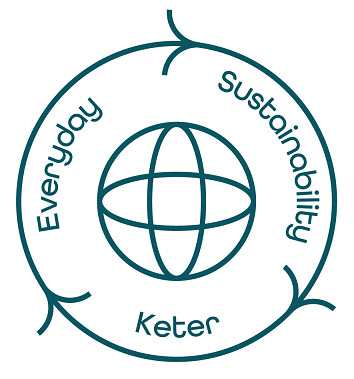
For over seventy years, Keter, a global consumer products company, has been leading the industry with their innovative designs. The company encourages sustainable consumption through the use of reusable plastics and by extending the life of their products. This includes ensuring that their operations, from material and design innovation to manufacturing processes, are undertaken responsibly. With products available in more than 100 countries and a focus on sustainable innovation driven by consumer insights, Keter manufactures an extensive range of indoor and outdoor furniture, storage and home, office, and organization solutions.
Keter has always put environmental consciousness at their core. From their earliest days, they have invested in innovation to provide the most durable products using minimum virgin resources. This enables consumers to enjoy their beautiful and functional designs year after year, while preserving the integrity of their natural environment.
The company leads in creating products for people that transform the places where they live, work, and socialize. At the same time, Keter helps customers live more sustainably via a circular economy, using recyclable content and recyclable design. In December of 2020, Keter announced the Keter Everyday Sustainability 2025 Pledge with a goal of achieving five commitments in five years. Commitments include:
- 55% of recycled content in total production
- Continued zero production of single-use plastic consumer products
- 25% reduction in greenhouse gas emissions from production
- Zero waste-to-landfill from production
- Product end-of-life programs implemented in all regions
Keter designs their long-lasting products for full recyclability and continues to increase their use of recycled resins in a near-zero-waste process. In 2021, 98% of scrap from production was recycled and added back into their products. Additionally, as the largest user of post-industrial and post-consumer plastics in their industry*, in 2021, they avoided 210,000 tons of CO2e emissions by using recycled polypropylene instead of virgin polypropylene.

Keter’s ultimate goal is circularity and their innovation and design principles guide them to create products durable products that minimize the use of virgin resources and eliminate waste at each stage of the value chain. They design all products to be 100% recycled and are on an ambitious trajectory to increase the use of recycled content in their products from 40% in 2020 to 55% in 2025. Research shows that about 25% of plastic products are recycled in Europe, whereas unfortunately less than 1% are recycled in North America.** By advancing end-of-life programs for the recycling of plastic products, they hope to see these rates increase substantially in their markets. Read more about Keter’s sustainability progress in their recently published 2021 Sustainability Report.
A few highlights of Keter’s 2021 sustainability journey include:
- 160,000 tons of recycled resin used
- >100 everyday sustainability product innovations launched
- 99.9% of consumer products were 100% recyclable
- 25% reduction in waste to landfill with three facilities achieving zero waste to landfill
- 20% reduction in greenhouse gas emissions
Learn more about Keter’s sustainable product initiatives here.

|
| Since 2019, several of Keter’s products manufactured in Europe carry the Blue Angel label. The Blue Angel is the ecolabel of the federal government of Germany and sets high standards for environmentally-friendly product design. |
Wayfair is committed to taking an active stand to protect our environment. Read more about Wayfair’s sustainability initiatives
here.
